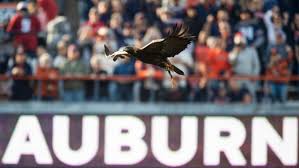U-M tournament rival Auburn battles misunderstandings about their name and mascot: They’re Tigers, not War Eagles
In the world of college athletics, few things generate as much excitement and rivalry as the NCAA basketball tournament. As the University of Michigan prepares to face off against Auburn in the latest round of March Madness, one peculiar aspect of Auburn’s identity continues to perplex fans and opponents alike: What exactly is Auburn’s mascot? Are they the Tigers or the War Eagles?
The Origins of Auburn’s Identity
Auburn University, officially known as the Auburn Tigers, boasts a long and storied athletic tradition. The school, located in Auburn, Alabama, adopted the Tiger as its official mascot, drawing inspiration from the fierce and powerful qualities associated with the animal. However, Auburn is also famously associated with the phrase “War Eagle,” which has led to widespread confusion among those unfamiliar with the school’s traditions.
The phrase “War Eagle” is not a reference to the school’s mascot, nor is it an alternative nickname for Auburn’s athletic teams. Instead, it is a battle cry, a rallying call that dates back well over a century and is deeply embedded in Auburn’s culture.
The Legend Behind War Eagle
The origins of “War Eagle” are debated, but one of the most popular stories traces back to a Civil War veteran who attended an Auburn football game in the late 19th century. According to legend, the veteran had brought a golden eagle he had found on the battlefield, and during the game, the eagle supposedly broke free and soared over the field as Auburn mounted a victorious comeback. Inspired by the moment, fans began chanting “War Eagle!” and the phrase stuck.
Another tale suggests that “War Eagle” was derived from the Plains Indian tradition, symbolizing strength and resilience. Regardless of its true origins, the battle cry remains a defining aspect of Auburn spirit and is passionately chanted by fans at sporting events.
Clarifying the Confusion
Despite the deep-rooted history of “War Eagle,” confusion persists, especially among those outside the Auburn community. Many assume that War Eagle refers to the school’s actual mascot, leading to occasional mix-ups in broadcasts, social media discussions, and even among rival fan bases.
Auburn’s official live mascot is Aubie the Tiger, a costumed character that has been a beloved figure at games and university events since the 1950s. Aubie embodies the school’s official team name, the Tigers, and is a consistent presence in Auburn’s athletic culture. Meanwhile, the War Eagle tradition is symbolized by a live eagle, which makes pre-game flights over Jordan-Hare Stadium, further cementing the bond between Auburn and its cherished battle cry.
How Auburn Embraces Both Traditions
Rather than attempting to clear up misconceptions with frustration, Auburn leans into the dual identity, proudly maintaining both the Tiger mascot and the War Eagle battle cry as integral parts of its tradition. The university’s fans and alumni understand that Auburn’s uniqueness lies in its ability to honor both traditions without needing to choose one over the other.
Before every home football game, the university hosts the “War Eagle Flight,” in which a trained eagle circles the stadium before landing at midfield. This thrilling moment energizes the crowd and reinforces the War Eagle chant. Meanwhile, Aubie the Tiger remains a central figure at basketball games, pep rallies, and community events, representing the university’s athletic teams.
Facing Michigan: Will the Debate Continue?
As Auburn prepares to take on the University of Michigan in the NCAA tournament, Michigan fans may still be puzzled by Auburn’s unique identity. Social media discussions have already surfaced, with Wolverines supporters asking why Auburn seems to have two mascots. The inevitable commentary on the Tigers versus War Eagle debate will likely continue throughout the tournament.
However, Auburn fans remain unfazed. For them, the blend of traditions only strengthens the school’s culture and spirit. Whether it’s hearing “War Eagle!” chanted by thousands in the stands or watching Aubie pump up the crowd, Auburn’s identity is not just a name—it’s an experience, a community, and a legacy.
So, as Michigan and Auburn face off, one thing remains clear: The Auburn Tigers are ready to fight for victory, and their War Eagle cry will echo long after the final buzzer sounds.



